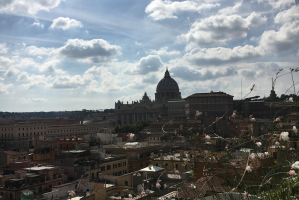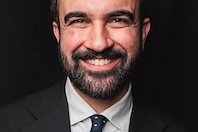Diocese of Westminster ordains four new Permanent Deacons
Four men have been ordained as Permanent Deacons for the Diocese of Westminster in a series of ordination ceremonies which concluded on 1st July 2006. This brings the total number of Permanent Deacons in Westminster to eight.
A further five new candidates will start formation in September 2006 which takes place at St John's Seminary near Guildford in Kent. Candidates will go there once a month, ten months of the year, over a period of three years.
Although Permanent Deacons are an established part of many Catholic Dioceses in England and Wales, in the Diocese of Westminster, the first invitation to men to apply for this ordained ministry was only made five years ago by the then newly appointed Archbishop of Westminster, Cardinal Cormac Murphy-O'Connor.
All the new Permanent Deacons in Westminster are married men. They are Tim Marsh, a retired Police Officer, from Hertford Parish, ordained on 3rd June by Bishop Alan Hopes; Mike Bykar, a teacher, from Cockfosters Parish, ordained on 18th June by Bishop Bernard Longley; Neville Dyckhoff, retired head of catering, from Watford Parish, ordained on 25th June by Bishop George Stack, and Jim Richards, Director of the Catholic Children's Society (Westminster), from Heston Parish, ordained on 1st July by Cardinal Cormac Murphy-O'Connor.
Newly ordained Permanent Deacon, Jim Richards described his journey to ordination: "It was some four years ago that my then parish priest, Fr Michael Tuck, dropped what was for me, something of a bombshell, when he asked me to think about putting myself forward for the Permanent Diaconate. A confusion of emotions ensued, of doubt, excitement and apprehension. However, of key immediate importance was discussion with my wife, Diane. Indeed, throughout the formation period it has often been made clear that we must ensure that our marriage is not to suffer through the inevitable pressures of the Diaconate and with her essential full support I took the plunge.
"In reflecting more broadly on how this all came about it is possible to point to a whole range of influences. Amongst these are my parents, my own family, including our children and the late Canon Peter Moore, who helped me in an earlier life changing event, that of entering the Church 26 years ago. There is also the nature of my work for the last sixteen years as head of the Catholic Children's Society. This has brought me into close ontact with so many people at parish and diocesan level, both lay and clergy, who are living witnesses of God's love for us all, especially those who are vulnerable, or in severe difficulties. "As for the future, I have long learnt that it is best not to predict it. That having been stated though, new roles will be open to me within my parish of Heston. These will include justice and peace matters, helping some particularly needy groups in our area and with my mother a Baptist and my late father an Anglican, taking a more active part in the ecumenical movement and whilst doing so not forgetting ours is a vibrant multi-faith community.
Finally, I need always to remember that I have not arrived at this point unaided. I will continue to need the generous support and many prayers that have accompanied me to date on my journey."
Canon Pat Browne, Director for Permanent Deacons, said: "In Westminster, we are encouraging men over 35 who feel a vocation to service of the Church and the World to seriously consider the Permanent Diaconate.
"If they are single they must also have a vocation to a celibate life. Married men will usually be over 40 and their youngest child will be nearing the end of his or her time in primary school. "Those whom the Church is calling to the Diaconate will normally be men still in the world of work. Of necessity then, their ministry in the parish will be part-time, if it is in the parish at all. Maybe for some their ministry will be at their place of work or they will do a full pastoral or administrative job at Diocesan level.
"Those whom the bishop calls to ordination will usually be men who have already demonstrated qualities of leadership at parish or diocesan level. They will be men of prayer and be highly regarded by their fellow-Catholics who will testify to their spirit of service, especially for the poor and the marginalised." What is a Permanent Deacon? There are three aspects of the Ministry of the Diaconate: The Ministry of Charity, the Ministry of the Word, and the Ministry of the Altar. The Deacon will serve to poor, the vulnerable and marginalised. He will proclaim the Gospel and sometimes preach at Mass. He will offer service at the altar at Mass, will distribute Holy Communion, will baptise and officiate at marriages and funeral services. The formation for the Permanent Diaconate is spread over a period of three years. If a candidate is married, the wife is also encouraged to take part.
Source: Archbishop's House


















